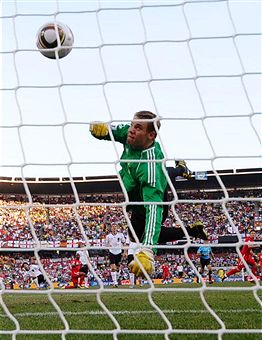By Andrew Warshaw
July 30 – Goal-line technology will not be introduced for almost another year at the earliest despite the continuing global outcry over Frank Lampard’s hotly disputed “goal-that-wasn’t” at the World Cup in South Africa.
Football’s lawmakers are due to formally discuss the issue in October but are barred from changing the rules until their full annual board next March, with July 2011 the earliest possible date for implementation.
Earlier this month, a preliminary meeting of the International Football Association Board (IFAB) in Cardiff agreed to extend the experiment of two additional officials, one behind each goal, to judge whether the ball has crossed the line.
As well as the Europa League, the system will now also be trailed in the Champions League as well as a string of lesser competitions.
The Cardiff meeting did not discuss goalline technology but the matter is on the agenda at the October session of the IFAB as a result of Sepp Blatter’s abrupt U-turn following Lampard’s unfairly disallowed goal in England’s 4-1 defeat by Germany.
Intially Blatter had viewed the additional linesmen concept as a means to hold at bay supporters of technology but agreed after England’s controversial elimination that it would be “nonsense” not to reconsider either Hawk-Eye or a fully researched microchipped ball system.
Yet it has now become clear that neither can be pushed through until next summer.
“If there is a move to bring in technology, it would have to be ratified at the annual board meeting in March,” said Raymond Kennedy, president of the Irish Football Association whose federation voted against goalline technology in March.
“The situation would then be that it could only be introduced the following July – at the earliest.”
News of a further delay will be viewed as a stalling tactic by the pro-technology lobby who were stunned when Northern Ireland and Wales, neither of whom have a strongly funded professional league, outvoted the English and Scottish FAs by siding with FIFA on the grounds of cost and a potential two-tier system.
Both federations felt part-time football would be left behind if technology is only introduced only at the highest level.
Kennedy now says the Irish would be prepared to match FIFA’s change of heart – but only in cases of the ball crossing the line and not other perceived injustices.
“We would give the basic principle serious consideration if they want to go that way,” he said.
“But my fear - and that of many people - is that if they bring it in for one thing, they’ll eventually bring it in for all kinds of other things like penalties and offside, and that’s going too far.
“I’m not sure whether we could have two different systems - goalline technology and two extra officials.
“I quite like the latter.
“That’s what would have picked up the Thierry Henry handball, after all.
“Then there is the question of what level you have goalline technology.
“Only when games are televised when the referee is under scrutiny?
“Only major cup finals?
“There are a lot of questions to be answered.”
Contact the writer of this story at zib.l1747979762labto1747979762ofdlr1747979762owedi1747979762sni@w1747979762ahsra1747979762w.wer1747979762dna1747979762
Related stories
July 2010: FIFA approve additional assistant referees for Champions League
July 2010: Goal-line technology not on agenda for IFAB meeting
July 2010: Scotland confirm they will back goal-line technology at IFAB meeting
June 2010: Andrew Warshaw – Don’t hold your breath for Blatter to introduce technology
June 2010: Blatter apologises to England and does U-turn over technology

